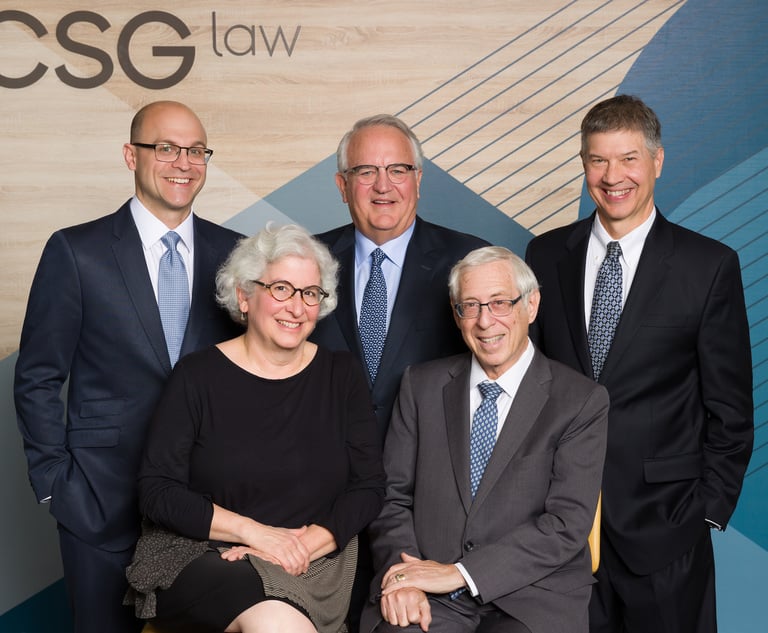BAR REPORT - Capitol Report
State bar tells Supreme Court drug influence evaluation is not generally accepted scientific evidence
June 10, 2019 at 08:01 AM
4 minute read
This is a status report provided by the New Jersey State Bar Association on recently passed and pending legislation, regulations, gubernatorial nominations and/or appointments of interest to lawyers, as well as the involvement of the NJSBA as amicus in appellate court matters. To learn more, visit njsba.com.
|Drug influence evaluation not generally accepted scientific evidence, says NJSBA to Supreme Court
The New Jersey State Bar Association (NJSBA) sounded off on the lack of scientific reliability of drug influence evaluations (DIE) in assessing a person's guilt in a driving under the influence matter, stating that the prosecution failed to establish its general acceptance within the scientific community under the Frye v. U.S., 293 F. 1013 (1923) standard. It filed an amicus curiae brief with the Supreme Court in the matter of State v. Olenowski, Docket No. 082253. The brief was written by NJSBA members John Menzel, Joshua H. Reinitz and past NJSBA President Miles S. Winder III.
The matter emanates from defendant Michael Olenowski's conviction for driving while intoxicated, which occurred on two separate occasions in the same year. In his first arrest, Olenowski appeared impaired, but had a blood alcohol content of .04 percent, drawing a request for a drug recognition expert (DRE) to perform a DIE. The DRE concluded Olenowski was under the influence of a combination of drugs and alcohol. His second arrest, which occurred six months later, registered a zero-percent blood alcohol content, though he failed field sobriety tests, drawing another request for a DRE. That DRE also concluded that Olenowski was under the influence of a combination of stimulants and depressants. The Law Division upheld the convictions, holding that DRE evidence was “generally acceptable and reliable in the scientific community.” The Appellate Division affirmed, finding that there was “sufficient credible evidence in the record” to support the Law Division's findings that Olenowski was driving while intoxicated on both occasions.
The NJSBA urged the Supreme Court to exclude the DRE evidence because of the lack of foundation that these tests meet the requirements of Frye. “Given the scientific nature of the DIE and DRE opinion, the appropriate standard of review for their admissibility should be based on general acceptance within the scientific community,” wrote the NJSBA.
The brief underscores the susceptibility of the accuracy of DRE opinions, pointing out that the relationship between the results of the DIE and the consumption of drugs or driving impairment are inconsistent among the scientific community. Unless the proponent of DIE techniques and DRE opinions derived from them lays an appropriate foundation, the NJSBA urged the Supreme Court to declare this evidence inadmissible for any purpose. It further argued that admissibility in prior cases is not enough to show general acceptance, and more is needed to meet that standard.
Oral arguments are not yet scheduled in this matter.
|Primary Day in New Jersey leaves few surprises
In what is typically one of the lowest turnout elections in New Jersey, last Tuesday's primary election garnered few surprises as voters head into the general election in November. In the Assembly, incumbent Joe Howarth lost to Jean Stanfield, who will retire as Burlington County sheriff. Republican Howarth lost his party's support after last year's party switch of Senator Dawn Addiego, who is now a Democrat. Howarth's delayed response to the Republican establishment in the days following Addiego's announcement drew concerns about Howarth's own allegiance to the party. He ran as a “MAGA Republican,” touting his loyalty to President Donald Trump.
In District 25, an open seat left by outgoing Assemblyman Michael Patrick Carroll was picked up by another Republican, Brian Bergen. Bergen is a veteran of the Iraq war and a small-business owner. Carroll gave up his seat to run for surrogate in Morris County, but lost in a surprising finish to Freeholder Heather Darling, a lawyer.
NJSBA member Cara Parmigiani won one of three seats for the Democratic nomination to run for Morris County freeholder in the fall.
|This content has been archived. It is available through our partners, LexisNexis® and Bloomberg Law.
To view this content, please continue to their sites.
Not a Lexis Subscriber?
Subscribe Now
Not a Bloomberg Law Subscriber?
Subscribe Now
NOT FOR REPRINT
© 2024 ALM Global, LLC, All Rights Reserved. Request academic re-use from www.copyright.com. All other uses, submit a request to [email protected]. For more information visit Asset & Logo Licensing.
You Might Like
View All
Appellate Div. Follows Fed Reasoning on Recusal for Legislator-Turned-Judge
4 minute read
Chiesa Shahinian Bolsters Corporate Practice With 5 From Newark Boutique
5 minute read
'A Mockery' of Deposition Rules: Walgreens Wins Sanctions Dispute Over Corporate Witness Allegedly Unfamiliar With Company
Trending Stories
Who Got The Work
Michael G. Bongiorno, Andrew Scott Dulberg and Elizabeth E. Driscoll from Wilmer Cutler Pickering Hale and Dorr have stepped in to represent Symbotic Inc., an A.I.-enabled technology platform that focuses on increasing supply chain efficiency, and other defendants in a pending shareholder derivative lawsuit. The case, filed Oct. 2 in Massachusetts District Court by the Brown Law Firm on behalf of Stephen Austen, accuses certain officers and directors of misleading investors in regard to Symbotic's potential for margin growth by failing to disclose that the company was not equipped to timely deploy its systems or manage expenses through project delays. The case, assigned to U.S. District Judge Nathaniel M. Gorton, is 1:24-cv-12522, Austen v. Cohen et al.
Who Got The Work
Edmund Polubinski and Marie Killmond of Davis Polk & Wardwell have entered appearances for data platform software development company MongoDB and other defendants in a pending shareholder derivative lawsuit. The action, filed Oct. 7 in New York Southern District Court by the Brown Law Firm, accuses the company's directors and/or officers of falsely expressing confidence in the company’s restructuring of its sales incentive plan and downplaying the severity of decreases in its upfront commitments. The case is 1:24-cv-07594, Roy v. Ittycheria et al.
Who Got The Work
Amy O. Bruchs and Kurt F. Ellison of Michael Best & Friedrich have entered appearances for Epic Systems Corp. in a pending employment discrimination lawsuit. The suit was filed Sept. 7 in Wisconsin Western District Court by Levine Eisberner LLC and Siri & Glimstad on behalf of a project manager who claims that he was wrongfully terminated after applying for a religious exemption to the defendant's COVID-19 vaccine mandate. The case, assigned to U.S. Magistrate Judge Anita Marie Boor, is 3:24-cv-00630, Secker, Nathan v. Epic Systems Corporation.
Who Got The Work
David X. Sullivan, Thomas J. Finn and Gregory A. Hall from McCarter & English have entered appearances for Sunrun Installation Services in a pending civil rights lawsuit. The complaint was filed Sept. 4 in Connecticut District Court by attorney Robert M. Berke on behalf of former employee George Edward Steins, who was arrested and charged with employing an unregistered home improvement salesperson. The complaint alleges that had Sunrun informed the Connecticut Department of Consumer Protection that the plaintiff's employment had ended in 2017 and that he no longer held Sunrun's home improvement contractor license, he would not have been hit with charges, which were dismissed in May 2024. The case, assigned to U.S. District Judge Jeffrey A. Meyer, is 3:24-cv-01423, Steins v. Sunrun, Inc. et al.
Who Got The Work
Greenberg Traurig shareholder Joshua L. Raskin has entered an appearance for boohoo.com UK Ltd. in a pending patent infringement lawsuit. The suit, filed Sept. 3 in Texas Eastern District Court by Rozier Hardt McDonough on behalf of Alto Dynamics, asserts five patents related to an online shopping platform. The case, assigned to U.S. District Judge Rodney Gilstrap, is 2:24-cv-00719, Alto Dynamics, LLC v. boohoo.com UK Limited.
Featured Firms
Law Offices of Gary Martin Hays & Associates, P.C.
(470) 294-1674
Law Offices of Mark E. Salomone
(857) 444-6468
Smith & Hassler
(713) 739-1250







